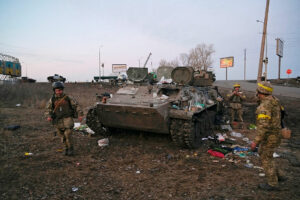THE Association of Southeast Asian Nations (ASEAN) does not support efforts to isolate Russia and seeks to pursue further engagement with Moscow in the near future, including on matters of trade, the Department of Foreign Affairs (DFA) said in a briefing.
Foreign Affairs Assistant Secretary for ASEAN Affairs Daniel R. Espiritu said during an online briefing on Thursday that Russia’s prime minister is due to participate in upcoming ASEAN meetings, and that the bloc plans to organize “economic and socio-cultural activities” involving Russia.
The ASEAN position leaves the region’s options open regarding key commodities that Russia can export in volume, like energy and grain.
“Russia has been a partner for a long time of ASEAN, and so we have a lot of common cooperation projects,” Mr. Espiritu said.
“In fact, 2022 is a year of scientific and technological cooperation between ASEAN and Russia. The relations between ASEAN and Russia transcend politics, and they include all of these economic and socio-cultural cooperation activities,” he added.
“We are also working on a work program… on trade and investment between ASEAN and Russia, and that would still go towards helping economic recovery in the wake of the pandemic and of course the crisis in Ukraine.”
ASEAN, however, remains concerned about the humanitarian situation in Ukraine and the destruction of its infrastructure. The bloc intends to provide humanitarian assistance to displaced people, and has called for a cessation of hostilities a number of times, he said.
Regarding the impact on the regional economy from the Russia-Ukraine war, Mr. Espiritu said ASEAN “will not be hampered simply because of the economic crisis” with active discussions within the bloc regarding energy security, food security and supply-chain disruptions.
In the past two years, ASEAN member-states have also come to broad agreement on relaxing travel restrictions within the region without sacrificing health safeguards, with similar travel arrangements reached with the European Union.
Mr. Espiritu said the DFA supports Philippine participation in the world’s largest trade bloc.
“Of course, the implementation of the RCEP (Regional Comprehensive Economic Partnership) can be a big help in regards to (gaining) leeway for economic recovery,” he said. “It is now up to the countries to maximize the benefits they can get from this agreement.”
The RCEP, which started coming into force in the various jurisdictions on Jan. 1, involves Australia, China, Japan, South Korea, New Zealand and the 10 members of the ASEAN.
The Philippines is one of three countries that have not ratified RCEP, along with ASEAN members Indonesia and Myanmar.
Representing about 30% of global gross domestic product, the RCEP allows for zero or reduced tariffs in trade between the members of ASEAN and its free trade agreement partners.
The DFA also reiterated Philippine backing for the ASEAN condemnation of Myanmar’s execution of two pro-democracy activists and two alleged terrorists.
“Aside from the position of ASEAN of expressing being extremely troubled and saddened by the execution of the four in Myanmar, the Philippines denounces that execution,” Mr. Espiritu said.
The Philippines raised its alert level for Filipino citizens in Myanmar after the military takeover, allowing only workers with live contracts to go to that country.
Despite appeals from Filipino workers in Yangon to lift travel restrictions, the DFA on Wednesday issued an Alert Level 4 warning covering 1,273 Filipinos resident in Myanmar.
“The DFA acknowledges the concerns of OFWs wishing to return to Myanmar despite the uncertainty and danger posed by the ongoing crisis. However, the safety and security of every single Filipino overseas remain the top priority of the Philippine government,” the department said in a statement.
A total of 701 Filipino nationals or around 60% of the resident population have been repatriated, the DFA said. — Alyssa Nicole O. Tan
